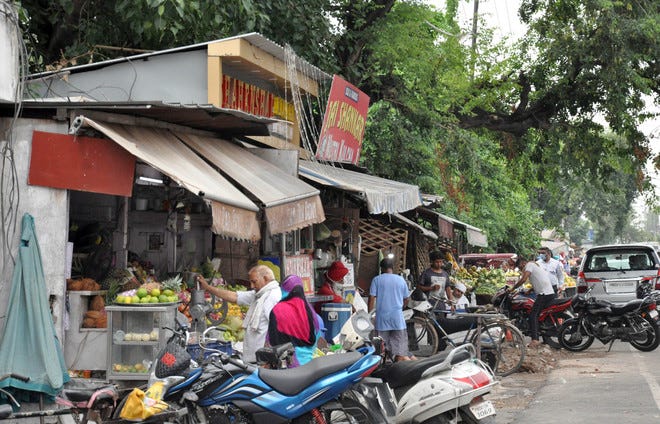Encroachments and corruption
Illegal transgressions are everywhere - parking on footpath, illegal building modifications, illegal shops in public places. Why are they there? Will they ever go away?
In a case before the Bombay High Court, the judges were passionately reprimanding the anti-encroachment department of the Mumbai Municipal Corporation for inaction against encroachments. The Court was then shown pictures of encroachments right outside the office of anti-encroachment department.
In India, illegal transgressions are everywhere. Shops extending onto the footpath, hawkers occupying footpaths, balconies illegally enclosed, homes illegally modified, illegal slums, illegal buildings, stolen electric connections, free water connections - we have become blind to them.
Why do they exist? Are Indians corrupt by nature? Do we not respect public domain, private ownership, personal space? Are all these problems connected by any chance? I think they are.
A state apart from its people
Indian concept of state is different. The ideal rulers of India had to earn their respect by following raj dharma. There are instances of learned sadhus demanding things of rulers and getting them. Chankya, a college professor in modern terms, got audience of entire Nanda council in presence of the Nanda king. It seems we were a society where government served the people.
Post islamic invasions, we went to a western concept of king. The king was always right and he owned everything. However, considering the vastness of India, this concept was not fully imposed in the remote areas where the concept of dharma remained.
The Christian renaissance brought in an element of raj dharma to the west. But colonial governance was left alone. Thus, the British government governing England (not Ireland or Scotland) was serving the people. But the British government governing the colonies (including Ireland and Scotland) in loco regis, in place of the king, was an extractive state. It owned everything and was never wrong. This reflected in the laws passed for the colonies by the British Parliament.
After independence too, India retained this overbearing state the माय बाप सरकार. Some of the early political leaders did intend to serve. However, the weight of the ruling state, hidden in the laws, rules, procedures and even in forms and filings pulled them down. The system built upon the ethos of ruling over the brown people, ultimately fell back to its default behaviour. As a ruler, the Indian state too wanted to impose on its own people.
To such a state, there is no allegiance
Citizens do not want to approach a state that wants to rule rather than serve. Instead the citizens co-opt their own, those who work for that state. It is thus that government officers, even peons gain influence. These government workers then pawn their influence for their benefit in the society.
In non-corrupt times, the benefit is convenience. Government servant gets better vegetables from the vendor. I knew of a butcher who would personally deliver better quality meat to the judges’ bungalow every Sunday (not as a bribe, he got proper payment). But in return judge would ignore if he failed to appear in his civil case as this butcher drank a lot. The judge also knew the butcher will be appear on Sunday.
In a corrupt state, however, the benefit becomes sinister - e.g. builders setting aside apartments for government officers as bribes for using more FSI than permitted, NGOs bribing babus for permissions, etc. These very officers make it almost impossible to set up a shop or building legally so that they can get opportunity to earn a commission.
This turns into a game of who “needs” other. Government officers too need other people in daily life. These people can then extract some benefits in some form or other. It is governance of connections. If you have connections you get served by the state. More important connection means more the state will bend to serve you.
In India this game is played out every day. Those without connections bend before the state while the state bends before those who do.
It happens in poor states
Most economic activity is adding value to resources by processing them or consuming them. In rich countries it is difficult to get away with this resource capture. It is possible but has to be done in a more nuanced manner.
But in poor countries it is easier. An overbearing state holds onto resources - like building permissions, FSI, seats in medical colleges etc. It thrives on scarcity. Indeed, the corruption happens when people do not have resources and state has. If people had the resources, then they do not need to bend before the state. That is why such encroachments, illegal constructions, theft of electricity etc. happens in 3rd world countries.
The problem is circular. Poor economy with overbearing state becomes corrupt. And the corruption keeps the economy poor and resource starved. India has been caught in this negative feedback loop for past 6 decades at the very least.
The Morphing of Indian State
On the ground, we perceive a change in intent of the political leadership since Modi came to power. The leaders, at least, appear to serve. In reality too, they do serve, though not as much as they advertise. At least in intent, we went back to the first decade right after independence. It is one reason why many feel that India has gained independence in 2014.
However, the deep state is definitely creating hurdles to this service attitude. What I would like to see is the morphing of the Indian State into a service oriented state away from this ruling mindset. This change may be the change of gear we need to propel us into next phase of our growth. Amit Shah is capable of setting this right. I hope he does and India is truly transformed permanently into a service oriented state. One can always hope.



